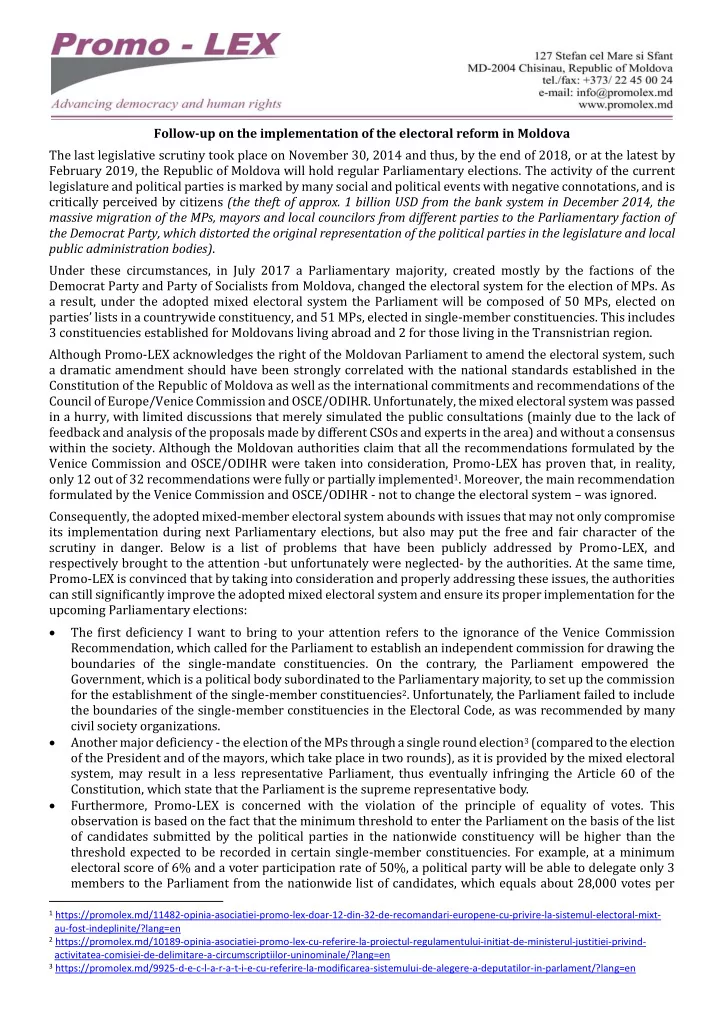

Follow-up on the implementation of the electoral reform in Moldova The last legislative scrutiny took place on November 30, 2014 and thus, by the end of 2018, or at the latest by February 2019, the Republic of Moldova will hold regular Parliamentary elections. The activity of the current legislature and political parties is marked by many social and political events with negative connotations, and is critically perceived by citizens ( the theft of approx. 1 billion USD from the bank system in December 2014, the massive migration of the MPs, mayors and local councilors from different parties to the Parliamentary faction of the Democrat Party, which distorted the original representation of the political parties in the legislature and local public administration bodies ) . Under these circumstances, in July 2017 a Parliamentary majority, created mostly by the factions of the Democrat Party and Party of Socialists from Moldova, changed the electoral system for the election of MPs. As a result, under the adopted mixed electoral system the Parliament will be composed of 50 MPs, elected on parties’ lists in a countrywide constituency , and 51 MPs, elected in single-member constituencies. This includes 3 constituencies established for Moldovans living abroad and 2 for those living in the Transnistrian region. Although Promo-LEX acknowledges the right of the Moldovan Parliament to amend the electoral system, such a dramatic amendment should have been strongly correlated with the national standards established in the Constitution of the Republic of Moldova as well as the international commitments and recommendations of the Council of Europe/Venice Commission and OSCE/ODIHR. Unfortunately, the mixed electoral system was passed in a hurry, with limited discussions that merely simulated the public consultations (mainly due to the lack of feedback and analysis of the proposals made by different CSOs and experts in the area) and without a consensus within the society. Although the Moldovan authorities claim that all the recommendations formulated by the Venice Commission and OSCE/ODIHR were taken into consideration, Promo-LEX has proven that, in reality, only 12 out of 32 recommendations were fully or partially implemented 1 . Moreover, the main recommendation formulated by the Venice Commission and OSCE/ODIHR - not to change the electoral system – was ignored. Consequently, the adopted mixed-member electoral system abounds with issues that may not only compromise its implementation during next Parliamentary elections, but also may put the free and fair character of the scrutiny in danger. Below is a list of problems that have been publicly addressed by Promo-LEX, and respectively brought to the attention -but unfortunately were neglected- by the authorities. At the same time, Promo-LEX is convinced that by taking into consideration and properly addressing these issues, the authorities can still significantly improve the adopted mixed electoral system and ensure its proper implementation for the upcoming Parliamentary elections: The first deficiency I want to bring to your attention refers to the ignorance of the Venice Commission Recommendation, which called for the Parliament to establish an independent commission for drawing the boundaries of the single-mandate constituencies. On the contrary, the Parliament empowered the Government, which is a political body subordinated to the Parliamentary majority, to set up the commission for the establishment of the single-member constituencies 2 . Unfortunately, the Parliament failed to include the boundaries of the single-member constituencies in the Electoral Code, as was recommended by many civil society organizations. Another major deficiency - the election of the MPs through a single round election 3 (compared to the election of the President and of the mayors, which take place in two rounds), as it is provided by the mixed electoral system, may result in a less representative Parliament, thus eventually infringing the Article 60 of the Constitution, which state that the Parliament is the supreme representative body. Furthermore, Promo-LEX is concerned with the violation of the principle of equality of votes. This observation is based on the fact that the minimum threshold to enter the Parliament on the basis of the list of candidates submitted by the political parties in the nationwide constituency will be higher than the threshold expected to be recorded in certain single-member constituencies. For example, at a minimum electoral score of 6% and a voter participation rate of 50%, a political party will be able to delegate only 3 members to the Parliament from the nationwide list of candidates, which equals about 28,000 votes per 1 https://promolex.md/11482-opinia-asociatiei-promo-lex-doar-12-din-32-de-recomandari-europene-cu-privire-la-sistemul-electoral-mixt- au-fost-indeplinite/?lang=en 2 https://promolex.md/10189-opinia-asociatiei-promo-lex-cu-referire-la-proiectul-regulamentului-initiat-de-ministerul-justitiei-privind- activitatea-comisiei-de-delimitare-a-circumscriptiilor-uninominale/?lang=en 3 https://promolex.md/9925-d-e-c-l-a-r-a-t-i-e-cu-referire-la-modificarea-sistemului-de-alegere-a-deputatilor-in-parlament/?lang=en
Recommend
More recommend